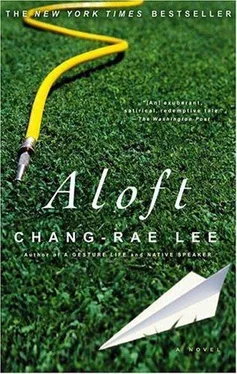"I still cook the way Jerry taught me," Theresa says. "Remove pork chops from package, generously salt and pepper, bake at 375 degrees until there are no signs of moisture."
"Amazingly, it works with any meat or fish," Paul says.
"Fowl, too."
"Now, I wasn't that bad," I say, mostly for the benefit of Eunice, for Alice and Jadie were sometimes actually there, watching me along with Theresa as I fumbled through the cabinets for the Shake 'n Bake and Hamburger Helper before Rita showed up. I couldn't afford a full-time nanny, and Battle Brothers was sinking fast, and I'd get home at six to cranky, hungry kids and burrow through the freezer for something that wasn't too brown-gray at the edges. "You have to realize I never had to cook until Theresa's mother died. Then it was every night I had to come up with something."
"At least until I took over," Theresa says.
"You were very advanced."
Eunice asks, "Why didn't you have Jack cook? He's older."
"I. don't know. I guess Jack just didn't seem up to it."
"Jerry was afraid of feminizing him," Theresa says, right on cue. And here comes the rest. But she looks up at me and appears to wink — which is the tiniest thing but wholly a salve. What she says isn't quite right, though, which I can say with some surety because I wasn't completely unaware of what I was doing back then. The fact of the matter was I didn't want Jack to have to think of his dead mother every night, at least in a ritualized way, which in my thinking was sure to happen if he had to don an apron and fry up hamburgers. For a year or so after she died he hardly said a word, he was just a kid with eyes, and as Theresa seemed the sturdier of the two in almost all respects, I made an executive decision to have him do other chores like repainting the back fence and raking leaves and hosing out the garbage cans, which he never once complained about, and I like to think it was the bracing physical activity that eventually snapped him out of it, though I'm probably mistaken on that one.
Some of Theresa's college friends (retro eyeglasses, thrift-store chic clothes, goatees galore) come around, and the talk gets a bit too pop-cultural and swervy and superallusive for me, and so I wander about the deck, briefly mingling with couples who are obviously friends of the hosts. They're decent enough people, well-heeled youngish parents with stiff drinks padding about in upturned collars and Belgian driving loafers, crooning incessantly about the cost of beach houses and Jag convertibles and nannies, the basic tune being why all this good living should be so dear (though of course if it weren't, what would they take such fascination in, or not-so-sly pride?). One magnificently bronzed, lean-armed woman named Kit sits me down and practically goes stone by stone through the immense landscaping project she is having done on her North Fork property, the massive excavation and Teletubbies berming, the football-field-length retaining walls of Vermont slate, the 2000-square-foot limestone patio and the bluestone-decked and — bottomed pool, and the literally hundreds of mature shrubs and trees, the job (which Battle Brothers Excalibur is fortunately doing) to ring up at nearly three hundred grand alone. The recession is not of her world. Kit isn't complaining or angling for special treatment, but rather simply telling me her story, as if she is some Old Testament figure chosen to endure an epochal test from which she might someday emerge righteous and whole.
By the time Kit is all but strapping me into her Mercedes SUV to drive me out east to her place in Southold and show me the work-in-progress, Jack pats me on the shoulder, having returned from the store. Kit practically leaps into his arms, hugging him a bit too firmly for even a pleased and grateful customer, and I'm sure it's nothing even though you still hear stories these days of people offering more than loads of money to get good contractors to sign up for a job. In my day you had to dress nice and chat for as long as the customer wanted when you showed up to give an estimate, parking yourself for a long spell at a lady's kitchen table trying not to stare at the widening gap in her robe and listen to whatever she needed to tell you about her never-home husband or sick mother or super-rotten kids, knowing that nine times out of ten you wouldn't get the job. Jack chastely pecks her on the cheek and excuses us, saying that the Battle men are being requested inside, and Kit tugs at his hand, reflexively unwilling to let him go.
I trail Jack into the house. He's just a shade shorter than I am, 6'1" or so, and built a bit differently, being lower-slung than am, his torso longer and thicker and his gait just like Daisy's was, meaning he moves in a slightly bowlegged fashion, knees pointing outward, a little bit like a pet iguana we once had, their similarities something I used to tease him about. He's got a hockey player's body, though he never played that, sticking to football and lacrosse, sports in which he excelled. As already mentioned, he's very good-looking, probably professionally so, and I can say with.some pride that he's got my best features, which are a strong chin and a thick tousle of naturally wavy hair and those sparkly eyes that some people have, speckled (and in our case, hazel-colored) irises that certain folks not-so-brightly wonder aloud about — namely, whether they're bad for your vision. But it's flattering, anyway, and as Jack knows well enough is almost unfairly attractive to the opposite sex, for really all you need to do is just meet someone's gaze and hold for a moment, like the first time I met his mother, or when I met Rita, take a long, slow-shuttered picture, and watch the thing steadily develop. I go into all this mostly because I find myself admiring Jack and Theresa more and more, not so much for the people they are (they are fine people) but for their physical qualities, and I know you'll think I do so because ultimately it's all about me, my legacy and what I've bestowed upon them and so on, but it's just the opposite. Perhaps it's seeing them both here today, in full-blown adulthood, but the notion occurs that whatever I have given them is in fact very little, and diminishes with each day, and that it's already happened that they define me probably more now than I do them, which of course is just as well.
In the kitchen Nidia points us toward the powder room saying it's Pop, my father, who I didn't realize was already here but of course had to be the whole time. Eunice is talking to him through the locked door, Rosario standing by. When she sees us she steps back and says he's been moaning as though he's in pain but won't let anyone in. Just then Pop yells, "I don't need anybody. You people go away" He says people like we're a crowd on a subway platform, nobody he cares to know.
Jack tries the knob and says, "Come on, Pop. Let's open the door now."
"Everything stinks!" is his answer. For some reason this is my cue to make a try.
"We just want to know that you're not hurt, Pop. Are you hurt?"
"Is that you, Jerome?"
"Yeah."
"Where the hell have you been?"
"Outside on the deck."
"Well, then, everybody clear out. I only want Jerome to help me. I want my son."
"You still have to open the door for me."
"I can't," he says, weakly now. "I can't."
Jack pulls out his fat Swiss Army knife (which I taught him from early on to carry always) and plucks out its embedded plastic toothpick for me, so I can push in the lock.
"Okay, everybody scram," I say loudly. "I'll take it from here." Jack opens his hands and I wave him and Eunice and Rosario away, as well as the few kids — none from our clan—
who've gathered in the hallway to rubberneck. When they've all gone back to the party I tell my father I'm coming in. He grunts, and I click out the tumbler.
Читать дальше











